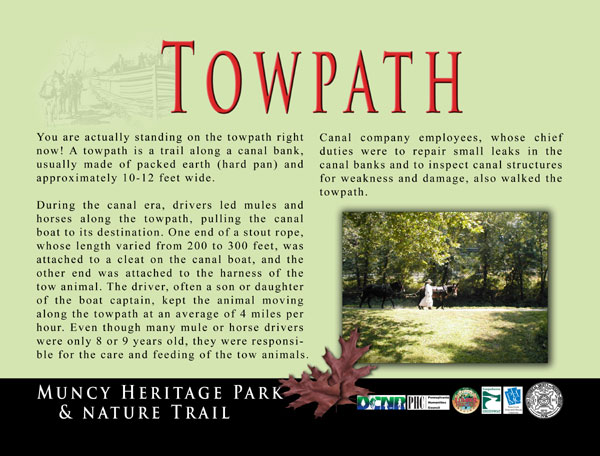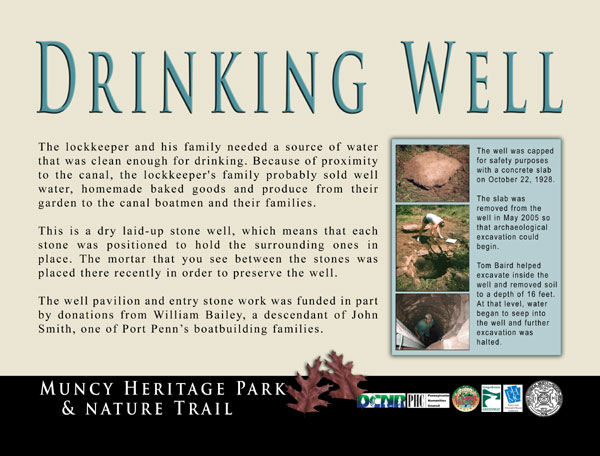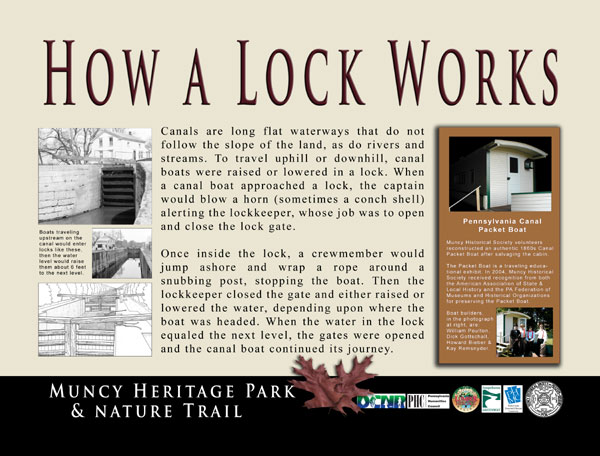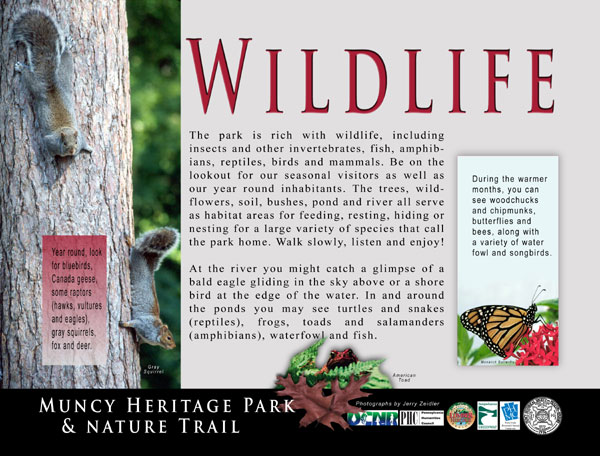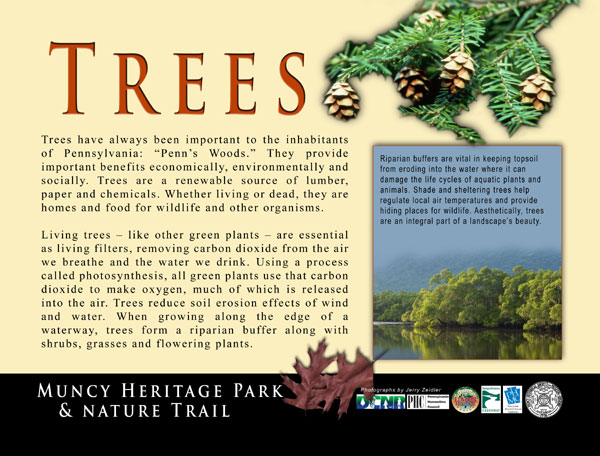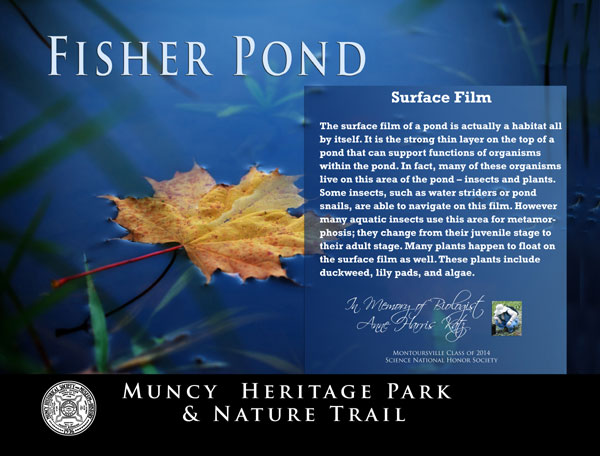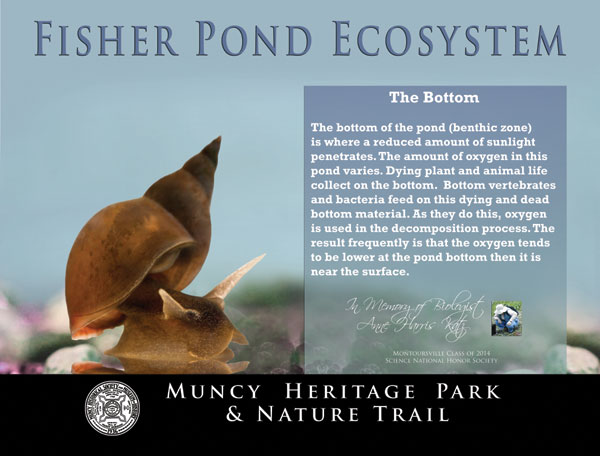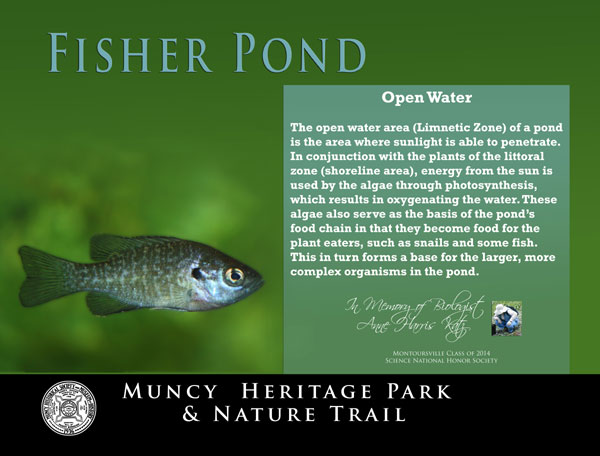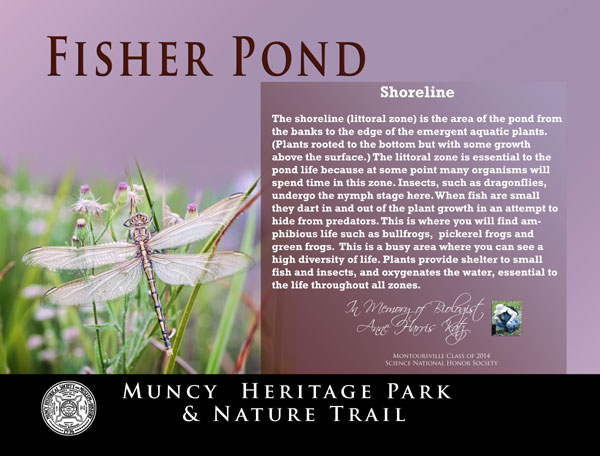Muncy Heritage Park and Nature Trail
A project of Muncy Historical Society
The Muncy Heritage Park and Nature Trail was a multi-year plan to develop 11 acres of historic and environmentally significant property into a park and trail to be utilized by all Lycoming County, Pennsylvania residents, as well as tourists and visitors to the Susquehanna River Valley. Located on the West Branch of the Susquehanna River, Muncy is a small town proud of its rural culture and historical heritage. This trail allows Muncy to showcase the history and natural beauty of Port Penn, a commercial center and residential area that grew out of and around the bustling West Branch Canal industry of the 1800s.
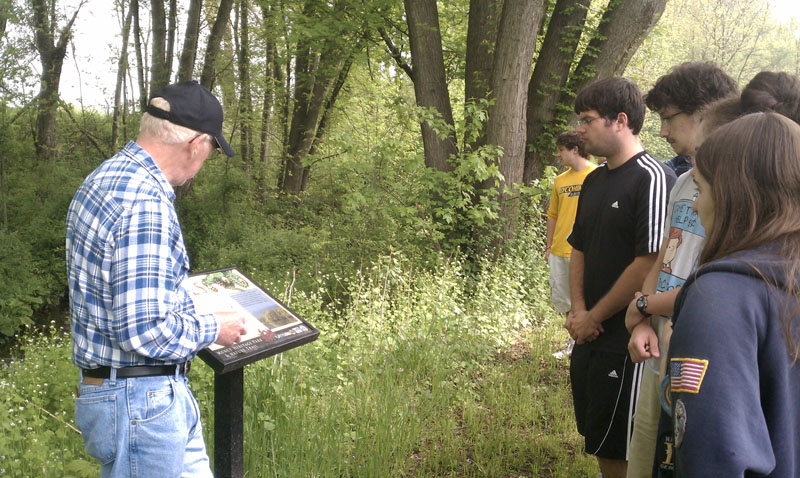
Bill Poulton gives a guided tour to Lycoming College students visiting the Muncy Heritage Park and Nature Trail.
Virtually explore Muncy’s Heritage Park and Nature Trail. Send directions to your device and then visit the park, exploring 11 beautiful acres. The park features interpretive panels that introduce the visitor to the wildlife of the area, as well as its historical past as an important double-lock on the Muncy Canal.
Muncy Heritage Park & Nature Trail Project
Intellectual Merit
Sponsored by the Muncy Historical Society and Museum of History (MSHMH), the Muncy Heritage Park and Nature Trail project has involved a variety of organizations including the archaeology and natural sciences departments of Lycoming College, the natural sciences and integrated studies department of Pennsylvania College of Technology, the Lumber Heritage Region, Northcentral Pennsylvania Conservancy, state Department of Environmental Protection, U.S. Army Corp of Engineers, state Fish and Boat Commission, Tiadaghton State Forest, Lycoming County Conservation District, Lycoming County Planning Commission, the National Canal Museum, the Pennsylvania Canal Society and the DCNR-Bureau of Recreation and Conservation.
This multi-year project incorporated all aspects of STEM (science, technology, engineering, and mathematics), social sciences such as anthropology and archaeology, and history, humanities, and art.
Broader Impacts
Prior to all structural work and environmental landscaping at the Muncy Heritage Park and Nature Trail project, archaeological and historical research was conducted and involved college students during summer field schools, as well as public and private school children (K-12), teachers and volunteers year-round. Public Archaeological excavations were held on the sites of the canal lock tender’s house and well, one of the remaining locks and a portion of the canal wall.
Biologists and forestry experts worked with adult volunteers and students to classify flora and fauna, design, and create the nature trail and this research was used when creating interpretive panels and historic facades.
Interpretive panels that describe life and labor along the Pennsylvania Canal are combined with illustrations that help visitors discover the diversity of plants and wildlife and the aquatic life found in the park. An observation deck and bird blind are placed at pond’s edge and 25+ taxa have been recorded at any one time, including nesting green herons.
A path that leads to the Susquehanna River overlooks the site of the Last Raft crash and offers canoe, kayak, and raft access to the river. A reconstructed bow and stern — a replica of a canal boat carrying cargo on the West Branch Canal — is housed in its own pavilion near the park’s entrance. There are a pavilion and picnic tables, and parking for the public. The latest project implemented at the park was the installation of solar-powered aerators to help manage the pond’s water quality and the well-being of its aquatic life.
In addition to providing co-operative and independent educational opportunities for students and volunteers of all ages, the Muncy Heritage Park and Nature Trail is a permanent park.
Impact
Northcentral Pennsylvania is primarily a rural, mountainous region and its largest county is Lycoming. With a population of 120,044, Lycoming County includes the West Branch of the Susquehanna River. Its county seat, Williamsport, is the birthplace of Little League Baseball and Softball, and each year hosts the annual Little League World Series, an international event.
The river lies at the base of the 1,600-foot Bald Eagle Mountains, at the foothills of the Alleghenies and to the north, the land rises in the forest-covered Appalachian Plateau, in places more than 2,000 feet high.
Once known as the “Lumber Capital of the World,” Lycoming County is 90 miles north of Harrisburg, Pennsylvania’s capital. More than 70 million people live within 300 miles of the county, and cities within this radius include Philadelphia, New York, Albany, Syracuse, Rochester, Buffalo, Erie, Pittsburgh, Baltimore, and Washington D.C.
However, despite its proximity to these major cities, the area’s attractions do not include many educational and recreational opportunities of a historic and discovery nature. The closest science museum is 90 miles away in Harrisburg; the closest art and anthropological museums are 65 miles away at Penn State University, State College.
There are several small historical societies and three museums. The Peter J. McGovern Little League Museum showcases that sport’s history and caters primarily to series visitors. The Lycoming County Historical Society has historic museum exhibits and a research library.
The Heritage Park and Nature Trail built by the Muncy Historical Society served as an archaeological field school for several local colleges and universities, and for independent research for undergraduates, grad students, and scientific professionals. Pennsylvania high school students utilized the project for independent research in a variety of fields including history, geology, geography, zoology, biology and anthropology.
The Public Archaeology portion of the project focused on the training of undergraduate archaeologists and anthropologists as field and research specialists within an authentic, historical framework, and it offered an opportunity for training and support to individuals interested in history as a career or as an enhancement to an academic career.
Principal Archaeologist and Park Consultant

Robin Van Auken of Hands-on Heritage
Robin Van Auken is the CEO and owner of Hands-on Heritage. She taught field schools at Muncy Heritage Park and Nature Trail while serving as an archaeology instructor at Lycoming College, Williamsport, PA. In addition to five years as a museum curator, she has 25 years experience in journalism and mass communications, and has authored, or co-authored, ten books of regional history.
Her professional memberships include the Register of Professional Archaeologists, the Society for Historical Archaeology, the Society for PA Archaeology, and Northcentral Chapter/PA Archaeology. She specializes in Public Archaeology projects and historic preservation. On the Internet at www.HandsOnHeritage.com.
Historic Canal
Few of the residents of Lycoming County realize the enormity of their cultural heritage, and the impact the canal system had on the settlement of America.
Many canals were obsolete almost as soon as they were finished, replaced by the railroad and eventually nation’s highways. However, while they operated, they fostered the pioneer spirit and helped relocate immigrants of the East Coast to the hinterlands. Although not profitable, most canals cost more to build than the income they generated, yet they were instrumental in the building of America.
Muncy’s Heritage Park and Nature Trail project bring a long-lost and nostalgic episode of the past to life for all visitors by using colorful and informative interpretative panels, historically accurate facades of people, places and boats, permanent and portable exhibits, self-guiding audio tours, documentary videos, a Web site, printed publications and pamphlets, educational handouts, and an 11-acre nature trail.
Seasonal demonstrations and re-enactments, history workshops, community activities, and a welcoming park setting encourage people to continue to visit the Heritage Park and Nature Trail year after year.
Collaboration
Muncy Historical Society and Museum of History is the owner of the 11-acre property and has spearheaded the project. At their invitation, the venture involved a variety of organizations including the archaeology, history and art departments of Lycoming College, the archaeology department of Bloomsburg University, the natural sciences and integrated studies department of Pennsylvania College of Technology, the Northcentral Pennsylvania Conservancy, Susquehanna Greenway River Connections, Pennsylvania Historic and Museum Commission, the Humanities Council, the Arts Council, Pennsylvania Department of Protection, U.S. Army Corp of Engineers, state Fish and Boat Commission, Tiadaghton State Forest, Lycoming County Conservation District, Lycoming County Planning Commission, the National Canal Museum, the Pennsylvania Canal Society, the Northcentral Chapter of the Society of Pennsylvania Archaeology, and the DCNR-Bureau of Recreation and Conservation.
The complementary resources of these organizations and the expertise of the scientific volunteers resulted in a unique program and provided access to a varied audience.

